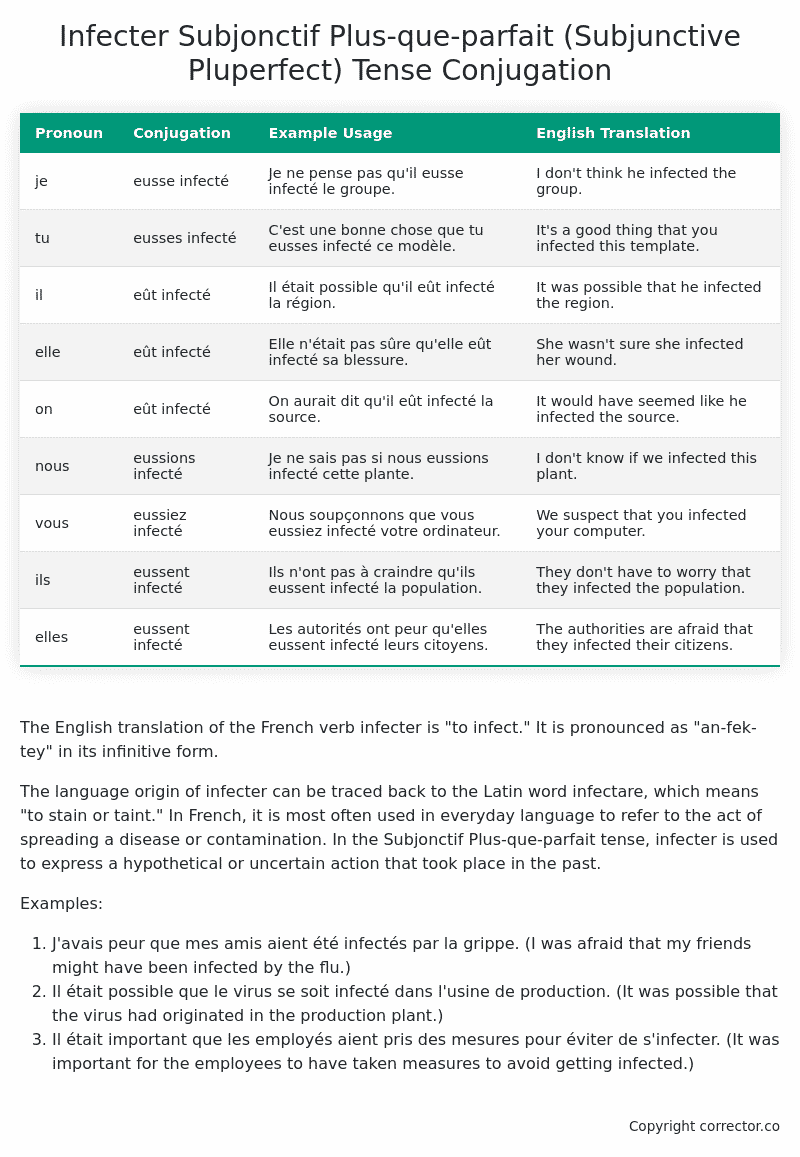Subjonctif Plus-que-parfait (Subjunctive Pluperfect) Tense Conjugation of the French Verb infecter
Introduction to the verb infecter
The English translation of the French verb infecter is “to infect.” It is pronounced as “an-fek-tey” in its infinitive form.
The language origin of infecter can be traced back to the Latin word infectare, which means “to stain or taint.” In French, it is most often used in everyday language to refer to the act of spreading a disease or contamination. In the Subjonctif Plus-que-parfait tense, infecter is used to express a hypothetical or uncertain action that took place in the past.
Examples:
- J’avais peur que mes amis aient été infectés par la grippe. (I was afraid that my friends might have been infected by the flu.)
- Il était possible que le virus se soit infecté dans l’usine de production. (It was possible that the virus had originated in the production plant.)
- Il était important que les employés aient pris des mesures pour éviter de s’infecter. (It was important for the employees to have taken measures to avoid getting infected.)
Table of the Subjonctif Plus-que-parfait (Subjunctive Pluperfect) Tense Conjugation of infecter
| Pronoun | Conjugation | Example Usage | English Translation |
|---|---|---|---|
| je | eusse infecté | Je ne pense pas qu’il eusse infecté le groupe. | I don’t think he infected the group. |
| tu | eusses infecté | C’est une bonne chose que tu eusses infecté ce modèle. | It’s a good thing that you infected this template. |
| il | eût infecté | Il était possible qu’il eût infecté la région. | It was possible that he infected the region. |
| elle | eût infecté | Elle n’était pas sûre qu’elle eût infecté sa blessure. | She wasn’t sure she infected her wound. |
| on | eût infecté | On aurait dit qu’il eût infecté la source. | It would have seemed like he infected the source. |
| nous | eussions infecté | Je ne sais pas si nous eussions infecté cette plante. | I don’t know if we infected this plant. |
| vous | eussiez infecté | Nous soupçonnons que vous eussiez infecté votre ordinateur. | We suspect that you infected your computer. |
| ils | eussent infecté | Ils n’ont pas à craindre qu’ils eussent infecté la population. | They don’t have to worry that they infected the population. |
| elles | eussent infecté | Les autorités ont peur qu’elles eussent infecté leurs citoyens. | The authorities are afraid that they infected their citizens. |
Other Conjugations for Infecter.
Le Present (Present Tense) Conjugation of the French Verb infecter
Imparfait (Imperfect) Tense Conjugation of the French Verb infecter
Passé Simple (Simple Past) Tense Conjugation of the French Verb infecter
Passé Composé (Present Perfect) Tense Conjugation of the French Verb infecter
Futur Simple (Simple Future) Tense Conjugation of the French Verb infecter
Futur Proche (Near Future) Tense Conjugation of the French Verb infecter
Plus-que-parfait (Pluperfect) Tense Conjugation of the French Verb infecter
Passé Antérieur (Past Anterior) Tense Conjugation of the French Verb infecter
Futur Antérieur (Future Anterior) Tense Conjugation of the French Verb infecter
Subjonctif Présent (Subjunctive Present) Tense Conjugation of the French Verb infecter
Subjonctif Passé (Subjunctive Past) Tense Conjugation of the French Verb infecter
Subjonctif Imparfait (Subjunctive Imperfect) Tense Conjugation of the French Verb infecter
Subjonctif Plus-que-parfait (Subjunctive Pluperfect) Tense Conjugation of the French Verb infecter
Conditionnel Présent (Conditional Present) Tense Conjugation of the French Verb infecter
Conditionnel Passé (Conditional Past) Tense Conjugation of the French Verb infecter
L’impératif Présent (Imperative Present) Tense Conjugation of the French Verb infecter
L’infinitif Présent (Infinitive Present) Tense Conjugation of the French Verb infecter
(this article)
Struggling with French verbs or the language in general? Why not use our free French Grammar Checker – no registration required!
Get a FREE Download Study Sheet of this Conjugation 🔥
Simply right click the image below, click “save image” and get your free reference for the infecter Subjonctif Plus-que-parfait tense conjugation!

Infecter – About the French Subjonctif Plus-que-parfait (Subjunctive Pluperfect) Tense
Formation
Common Everyday Usage Patterns
Hypothetical Situations
Reported Speech
Doubt, Wishes, and Emotions
Interactions with Other Tenses
Present Subjunctive
Imperfect Subjunctive
Conditional
Summary
I hope you enjoyed this article on the verb infecter. Still in a learning mood? Check out another TOTALLY random French verb conjugation!


